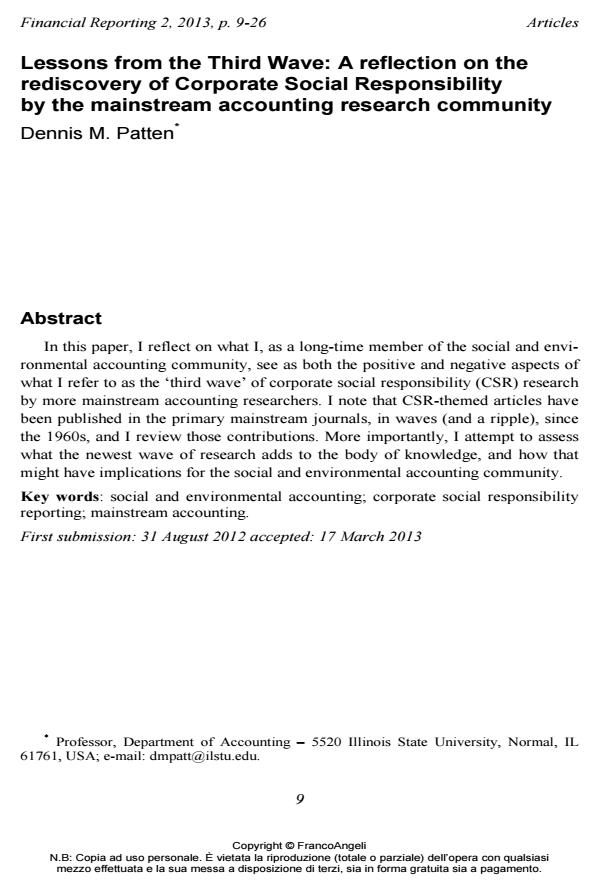Lessons from the Third Wave: A reflection on the rediscovery of Corporate Social Responsibility by the mainstream accounting research community
Titolo Rivista FINANCIAL REPORTING
Autori/Curatori Dennis M. Patten
Anno di pubblicazione 2013 Fascicolo 2013/2
Lingua Inglese Numero pagine 18 P. 9-26 Dimensione file 648 KB
DOI 10.3280/FR2013-002002
Il DOI è il codice a barre della proprietà intellettuale: per saperne di più
clicca qui
Qui sotto puoi vedere in anteprima la prima pagina di questo articolo.
Se questo articolo ti interessa, lo puoi acquistare (e scaricare in formato pdf) seguendo le facili indicazioni per acquistare il download credit. Acquista Download Credits per scaricare questo Articolo in formato PDF

FrancoAngeli è membro della Publishers International Linking Association, Inc (PILA)associazione indipendente e non profit per facilitare (attraverso i servizi tecnologici implementati da CrossRef.org) l’accesso degli studiosi ai contenuti digitali nelle pubblicazioni professionali e scientifiche
In this paper, I reflect on what I, as a long-time member of the social and environmentalaccounting community, see as both the positive and negative aspects ofwhat I refer to as the ‘third wave’ of corporate social responsibility (CSR) researchby more mainstream accounting researchers. I note that CSR-themed articles havebeen published in the primary mainstream journals, in waves (and a ripple), sincethe 1960s, and I review those contributions. More importantly, I attempt to assesswhat the newest wave of research adds to the body of knowledge, and how thatmight have implications for the social and environmental accounting community.
Parole chiave:Social and environmental accounting; corporate social responsibilityreporting; mainstream accounting.
- On the centrality of peripheral research and the dangers of tight boundary gatekeeping Yves Gendron, Michelle Rodrigue, in Critical Perspectives on Accounting 102076/2021 pp.102076
DOI: 10.1016/j.cpa.2019.02.003 - Accounting research boundaries, multiple centers and academic empathy Giovanna Michelon, in Critical Perspectives on Accounting 102204/2021 pp.102204
DOI: 10.1016/j.cpa.2020.102204 - Nonfinancial Corporate Social Responsibility Reporting and Firm Value: International Evidence on the Role of Financial Analysts Albert Tsang, Kun Tracy Wang, Yue Wu, Jeff Lee, in European Accounting Review /2024 pp.399
DOI: 10.1080/09638180.2022.2094435 - Integration of Research Perspectives in Sustainability Accounting – A Systematic Literature Review and a Citation Network Study Ute Laun, Katrin Hummel, in SSRN Electronic Journal /2021
DOI: 10.2139/ssrn.3979843 - Seeking legitimacy Dennis M. Patten, in Sustainability Accounting, Management and Policy Journal /2019 pp.1009
DOI: 10.1108/SAMPJ-12-2018-0332 - Advances in Environmental Accounting & Management: Social and Environmental Accounting in Brazil Martin Freedman, Bikki Jaggi, pp.1 (ISBN:978-1-78635-376-4)
- CSR disclosure: the more things change…? Charles H. Cho, Giovanna Michelon, Dennis M. Patten, Robin W. Roberts, in Accounting, Auditing & Accountability Journal /2015 pp.14
DOI: 10.1108/AAAJ-12-2013-1549 - Challenges in Managing Sustainable Business Susanne Arvidsson, pp.3 (ISBN:978-3-319-93265-1)
- Current Global Practices of Corporate Social Responsibility Selena Aureli, Maria Gabriella Baldarelli, Mara Del Baldo, pp.213 (ISBN:978-3-030-68385-6)
- The impact of community expectations on corporate community involvement disclosures in the UK Kemi C. Yekini, Ismail Adelopo, Emmanuel Adegbite, in Accounting Forum /2017 pp.234
DOI: 10.1016/j.accfor.2016.12.006 - Challenges in Managing Sustainable Business Susanne Arvidsson, Jeaneth Johansson, pp.77 (ISBN:978-3-319-93265-1)
- Sustainability reporting and corporate environmentally sustainable investment Leonardo Becchetti, Sara Mancini, Nazaria Solferino, in Applied Economics /2025 pp.8899
DOI: 10.1080/00036846.2024.2405198 - Does CSR Reporting Really Impact FERCs? Rachel N. Birkey, Ronald P. Guidry, Dennis M. Patten, in Accounting and the Public Interest /2017 pp.144
DOI: 10.2308/apin-51921 - The New Wave of CSR-Related Mainstream Accounting Research: On the Performative Effects of Literature Reviews Manuel Castelo Branco, in Social and Environmental Accountability Journal /2024 pp.37
DOI: 10.1080/0969160X.2024.2319882 - Critical perspectives on social and environmental accounting Charles H. Cho, Sophie Giordano-Spring, in Critical Perspectives on Accounting /2015 pp.1
DOI: 10.1016/j.cpa.2015.09.001 - The first impact of EU regulation on non-financial disclosure: An exploratory analysis in the oil & gas sector Cristian Carini, Laura Rocca, Monica Veneziani, Claudio Teodori, in Corporate Ownership and Control /2019 pp.24
DOI: 10.22495/cocv17i1art3 - Global financial crisis and relevance of GRI disclosure in Italy. Insights from the stakeholder theory and the legitimacy theory Luca Fornaciari, Caterina Pesci, in FINANCIAL REPORTING 1/2018 pp.67
DOI: 10.3280/FR2018-001003 - Quantitative research and the critical accounting project Alan J. Richardson, in Critical Perspectives on Accounting /2015 pp.67
DOI: 10.1016/j.cpa.2015.04.007 - Does firms’ corporate social responsibility reduce crime? Chenwei Sun, Justin Jin, Khalid Nainar, Gerald Lobo, in International Review of Economics & Finance 103719/2024 pp.103719
DOI: 10.1016/j.iref.2024.103719 - The Role of the Social and Environmental Accounting Community ‘Post’ Pandemic Carmen Correa Ruiz, José Juan Déniz Mayor, Nuria Descalzo Ruiz, Jesse Dillard, in Social and Environmental Accountability Journal /2023 pp.56
DOI: 10.1080/0969160X.2023.2169318
Dennis M. Patten, Lessons from the Third Wave: A reflection on the rediscovery of Corporate Social Responsibility by the mainstream accounting research community in "FINANCIAL REPORTING" 2/2013, pp 9-26, DOI: 10.3280/FR2013-002002